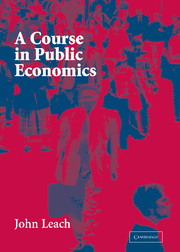Book contents
- Frontmatter
- Contents
- List of Figures
- Preface
- 1 Introduction
- Markets
- Externalities
- Public Goods
- Imperfect Competition
- Taxation and Efficiency
- Asymmetric Information and Efficiency
- 19 Asymmetric Information
- 20 Preference Revelation
- 21 Regulation of a Natural Monopoly
- 22 Other Examples of Asymmetric Information
- Asymmetric Information and Income Redistribution
- A Note on Maximization
- References
- Index
20 - Preference Revelation
from Asymmetric Information and Efficiency
Published online by Cambridge University Press: 06 July 2010
- Frontmatter
- Contents
- List of Figures
- Preface
- 1 Introduction
- Markets
- Externalities
- Public Goods
- Imperfect Competition
- Taxation and Efficiency
- Asymmetric Information and Efficiency
- 19 Asymmetric Information
- 20 Preference Revelation
- 21 Regulation of a Natural Monopoly
- 22 Other Examples of Asymmetric Information
- Asymmetric Information and Income Redistribution
- A Note on Maximization
- References
- Index
Summary
Chapter 10 described the optimal quantity of a pure public good and argued that it would not be provided in a competitive environment. Attempts to provide the good privately are frustrated by free-riding, which is individually rational but ultimately self-defeating. The government plays a major role in the provision of these goods because it can eliminate free-riding by dictating the quantity provided and the manner of its financing.
Providing the right quantity of public goods is not something that the government can easily do. The optimal quantity of a public good depends upon the preferences of the people in the community, but these preferences are not immediately observable. The government must ask people to disclose the intensity of their desire for the public good. However, the people who benefit from the public good are also, by and large, the people who pay for it. If they believe that their disclosures will affect their taxes, they might strategically misrepresent their preferences. The government's decision would then be based upon inaccurate information.
The government can act correctly only if it can obtain truthful information about preferences, and this information might not be willingly revealed by the people who have it. This problem is called the preference revelation problem. This chapter examines a simple economy in which preferences might not be truthfully revealed, and discusses the means through which the government can circumvent the problem.
- Type
- Chapter
- Information
- A Course in Public Economics , pp. 304 - 316Publisher: Cambridge University PressPrint publication year: 2003
- 1
- Cited by



